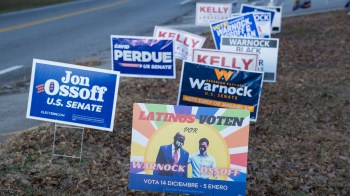The economics of a runoff election
Share Now on:
The economics of a runoff election
We’re thinking about how money is spent on runoffs, but we should be looking at a different part of the fundraising process. So says Lawrence Norden, Deputy Director for the Brennan Center for Justice at NYU Law School.
“Whether or not money is spent differently, it’s going to be raised differently,” he says.
Because of Supreme Court decisions like Citizens United, there’s been a dramatic increase in what Norden calls ‘outside money.’
“[Money] that’s not coming from the candidates, that’s not coming from the parties, that’s coming from outside groups,” he says. “That means Super PACs, that means these new dark money groups, 501(C)(4)s. They’re spending an extraordinary amount, often times more than the candidates themselves are spending.”
But, while everyone wants to get voters out, doing it an additional time, “that’s going to take additional resources,” says Tracy Sturdivant, co-founder of the Make it Work Campaign, a non profit that works to creates economic security for women.
At least, notes Sturdivant, runoffs have one bright side. For organizations, trying to get voters to the polls also means a chance to recalibrate.
“They’re going to take what they learned and put more resources towards the activities that actually did encourage voters to turn out the first time,” she says.
But even so, voter fatigue can make runoffs tough — for all parties involved.
There’s a lot happening in the world. Through it all, Marketplace is here for you.
You rely on Marketplace to break down the world’s events and tell you how it affects you in a fact-based, approachable way. We rely on your financial support to keep making that possible.
Your donation today powers the independent journalism that you rely on. For just $5/month, you can help sustain Marketplace so we can keep reporting on the things that matter to you.


















